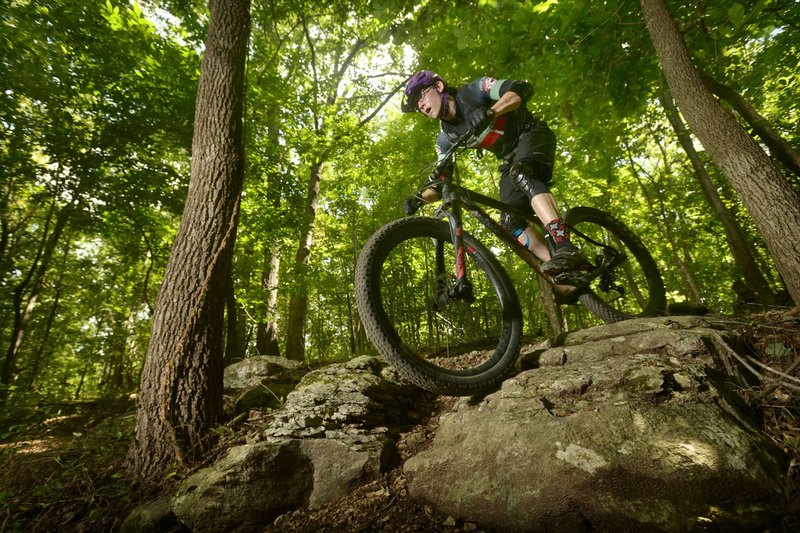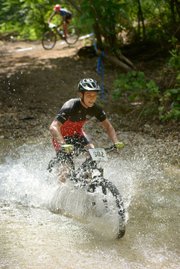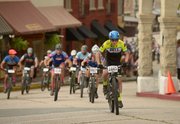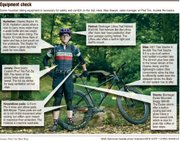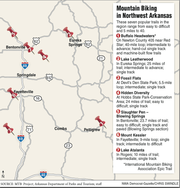The region’s network of mountain biking trails is quickly gaining a reputation as one of the country’s best with accolades in several magazines and blogs over the last few years.
A crew of 10 writers, editors, photographers and videographers from bike magazine rode the region’s trails for two weeks last fall to test out the 2017 model mountain bikes for its annual “Bible of Bike Tests” article, which acts as a gear and destination guide. It published in January.
RELATED ARTICLE
http://www.nwaonlin…">Biking league attracts students to trails
National Geographic in May named Bentonville one of America’s 20 Best Mountain Bike Towns, although the article notes trails throughout the region. The towns were selected for their “bucket- list rides, new trail development and a variety of outdoor recreation, and a fun, bike-friendly vibe,” according to its website.
Other towns included well-established mountain biking meccas like Moab, Utah, and Crested Butte, Colo.
Bentonville made Outside magazine’s list of “The 28 Best Trips of 2016” and again as one of “The 25 Best Towns of 2017,” with its trails cited as a highlight.
The numerous, glamorous reviews reignited Chris Strobel’s interest in mountain biking.
“I kept seeing really good, really, really good reviews. People from all over the world come here, pro riders and everything,” he said July 27 at the Slaughter Pen trailhead. “I thought if they’re doing it, it must be good.”
Strobel used to mountain bike wherever he could when he was younger. There weren’t specific trails dedicated to mountain biking when he was growing up in Missouri, he said.
He bought a $150 bike and hit the trails again a couple of months ago, trying out Bentonville’s Slaughter Pen, the trails at Hobbs State Park-Conservation Area and Lake Atalanta in Rogers as well as others.
The trails “far, far exceeded” Strobel’s expectations, so he decided to invest in a better quality bike to be able to tackle more technical trails. Mountain biking is a cardio exercise he can enjoy after working long hours, he said.
NOT JUST THE LOCALS
A trail system enhances the quality of life for those in the community and increases property values and tourism, area officials said.
Mountain bikers, hikers, runners, dog walkers and bird watchers use soft-surface trails. They encourage people to get outdoors and recreate.
“Mountain bikers build those trails, but they’re doing it for everybody,” said Brannon Pack, executive director of Ozark Off Road Cyclists, a nonprofit organization started in 1997.
The group has developed trail systems across the state, including overseeing improvement to the Lake Fayetteville trail system, the Mount Kessler trail system, Lincoln Lake in Lincoln and Lake Leatherwood Park in Eureka Springs, among others.
It’s difficult to measure the economic impact of a trail system to a community, officials said. However, the outdoor recreation economy in Arkansas — which mountain biking plays a part of — generates 96,000 jobs, $9.7 billion in consumer spending, $2.5 billion in wages and $698 million in state and local tax revenue, according to Outdoor Industry Association’s 2017 National Recreation Economy Report.
There were 2,956 trail users at Mount Kessler Regional Park from June 13 to July 26, according to numbers provided by Matt Mihalevich, Fayetteville trail coordinator.
Armadillo’s Last Stand trail at Slaughter Pen saw a monthly average of 2,642 users from Aug. 18, 2015, to July 26, 2017, according to numbers from the Bentonville Parks and Recreation Department. Slaughter Pen’s Urban Trail saw about 2,550 users monthly in the same time period.
There’s no way to know how many of those trail users are local or from out of town, officials said. However, it’s common to see out-of-state license plates at trailheads.
Erin Rushing, executive director of NWA Trailblazers, said he recently ran into riders from Canada and northern Minnesota on the Back 40 trail in Bella Vista. They chose to spend their vacations checking out the area’s trails.
“Building all these trails, I didn’t see that coming,” Rushing said of the amount of trail users who come from other places. “In my shallow mind, I’m thinking we’re just building these trails for the locals, but now it’s not. It’s for a regional draw, even a national draw for people to come here and bike.”
Rushing was a consultant for the Trailblazers since the early 2000s until he was hired as its executive director in early 2016.
IN THE FOREFRONT
Mountain biking’s start in Arkansas dates back to 1987 when two Devil’s Den State Park employees took a road trip to attend the Fat Tire Mountain Biking Festival in Crested Butte, Colo. They brought back copious notes and advocated for mountain biking to be an acceptable trail use in a time when other states were banning it because officials weren’t sure how to handle the growing activity, Pack said.
“Arkansas was really a leader as far as mountain biking goes, as far as access,” he said.
Fossil Flats was the trail bikers first started to ride in Devil’s Den. It’s still ridden today. The park hosts the Ozark Mountain Biking Festival, which will celebrate its 30th year in April.
Bikers built their own trails without permission from landowners for the next decade, something biking officials would not condone now, Pack said. It was a national trend that also took place locally.
The Ozark Off Road Cyclists formed in 1997 to become the state’s first mountain biking advocacy group. It’s grown to 500 members over five branches in 25 percent of the state and continues to oversee trail building projects.
The Bentonville/Bella Vista Trailblazers Association was established in Benton County around the same time the Ozark Offroad group was starting in Washington County. The group constructed a paved trail around Bella Vista Lake, which became a catalyst for other paved trail projects, Rushing said.
The organization is now known as NWA Trailblazers and is a key player in the soft-surface trail development as well. It spearheaded — along with Tom Walton, grandson of Wal-Mart founder Sam Walton, and the Walton Family Foundation — the development of Slaughter Pen Mountain Bike Park, which opened in 2005.
The 18-mile trail system was just the beginning of soft-surface trails in Benton County with more than 50 miles of trails added since.
FINDING MOTIVATION
The region’s and state’s trail system has grown over time and now includes four International Mountain Bicycling Association Epic rides, three cities with Ride Center designations and the first regional ride center designation.
The association designates destination-worthy trail systems as Ride Centers and long, adventurous backcountry trails as Epics.
“We’re the smallest state west of the Mississippi. That’s saying something,” said Joe Jacobs, marketing and revenue manager for Arkansas State Parks.
It was “just all of a sudden very obvious” mountain biking was a major tourist attraction for the state, he said. Arkansas ranks at the top with California as the states having the most Epic trails. Right behind are Oregon, Colorado and Virginia with three each, according to the association’s website. There are 43 Epic trails in the world.
An explosion of soft surface trail growth over the past two years was an effort to entice IMBA into holding its biennial world summit in Bentonville.
The group hand-selects its world summit locations because they need to be “best in class examples” of trail advocacy, design, construction, community engagement and tourism, said Andy Williamson, director of program development for the association.
Previous summits were held in Steamboat Springs, Colo.; Santa Fe, N.M.; Augusta, Ga.; Park City, Utah; and Whistler, British Columbia.
Bentonville bikers had asked the association to consider their city a few years earlier, but the trail system, though good, wasn’t where it needed to be to host the event, organizers said.
So the Trailblazers, backed by the Walton Family Foundation, went to work and built 40 miles of trail in Bella Vista and the first eight miles of Coler Mountain Bike Preserve in Bentonville within about 10 months in time for summit attendees to enjoy, Rushing said.
The association noticed, Williamson said.
“Boy they went gangbusters,” he said. “They earned it. They made it so we couldn’t say no.”
The development of the area’s trails is unbelievable, said Todd Faubus, Bentonville resident.
“When they first started cutting in just this first trail right here, I thought that was all they were going to do, and I thought, ‘Man, that’s awesome,’” he said with a laugh at the top of the free ride park at Slaughter Pen. “To see it where it is now is this sense of pride. It’s just really, really cool.”
Faubus described the trail systems as “best in class” and something for everyone and all skill levels. He was riding the berms with his 5-year-old son and 9-year-old nephew the hot and humid evening of July 27.
A trail system is enhanced by the supporting amenities — restaurants, shops and other attractions — in the community and accessibility to those amenities, which is an attribute that makes the region’s trail system unique, Williamson said.
“You can legitimately ride from your house, restaurant, hotel, brewery, bike shop to amazing trails and back and never get in your car,” he said.
GROUP EFFORT
The key component to a quality trail system, is the collaboration between philanthropists, government agencies, land owners and managers along with biking organizations and their volunteers, Williamson said. Northwest Arkansas does it well, he said.
The Walton Family Foundation has invested $13 million into the region’s soft-surface trail system from 2000 to 2016.
“Soft-surface trails play an important role in our efforts to protect green spaces across the region,” Karen Minkel, foundation home region program director, said in an email statement. “Trails allow us to preserve natural assets and at the same time give hikers and mountain bikers access to the hidden beauty of the Ozarks.”
Tom Walton was named Arkansas Tourism Person of the Year in 2016 during the annual Governor’s Conference on Tourism, largely for his work to get trails built in the region and state.
The foundation’s investment exaggerated the speed and scale in which trails could be built, but the other stakeholders needed to believe in the value a trail system brings to a community, Williamson said.
“Just because the Waltons have a lot of money doesn’t mean they were able to execute this [by themselves],” he said.
FUTURE
The region hasn’t begun to hit its peak potential when it comes to soft-surface trails, leaders said.
“I would say in five years we could easily double, assuming we can maintain what we currently have,” Rushing said.
The Back 40 is the first phase of a 150-mile system planned for the Bella Vista area. Another eight miles should be finished at Coler by the end of this year, Rushing said. The Trailblazers are also looking at Eureka Springs for some projects.
Ozark Offroad is helping with the development of five miles planned for City Lake in Siloam Springs, which is slated to open next year.
“What the limit is, what the capacity is, I don’t know,” Rushing said. “If there’s people using them and people maintaining them, we can continue to build more trails.”
Volunteers have been essential in the region’s trail development and maintenance since the beginning of mountain biking in Arkansas 30 years ago, Pack said. The growth of the trail system will not be sustainable if fostering a healthy volunteer community isn’t a focus.
Volunteer hours can also be used for grant matches to secure money for more trail projects, he said. For example, the 1,100 volunteer hours people gave to help build a mile of trail in Fayetteville’s Gregory Park last winter was used to receive grant money to add flow trails, a skills park and pump track in the 19-acre park that’s two blocks away from Woodland Junior High School, Pack said.
“Without volunteers, this destination we’re creating doesn’t exist,” he said. If the volunteer base grows with the trail mileage, “We might have just scratched the surface as to what the possibilities are.”
IMBA designations
The International Mountain Bicycling Association Model Trails Program recognizes destination-worthy mountain bike trail systems as ride centers and adventurous backcountry trails as epics.
Bentonville, Fayetteville and Hot Springs are Arkansas’ three ride centers, which recognizes large-scale mountain bike facilities that offer something for every rider and serve as a social and education hub.
Northwest Arkansas was given the first and only regional ride center designation as the Bentonville and Fayetteville ride centers are less than 30 miles apart.
Its epic designation denotes a a trail that offers a true backcountry riding experience that is physically and technically challenging, more than 80 percent singletrack and at least 20 miles in length.
Arkansas’ four Epic trails include the Upper Buffalo Mountain Bike Trial in the Ozark National Forest, the Womble Trail in Montgomery County, the Lake Ouachita Vista Trail near Mount Ida and the 108-mile Ouachita National Recreation Trail across western central Arkansas.
The Syllamo Trail system in the Ozark-St. Francis National Forest near Mountain View was previously an Epic but doesn’t meet the current standards and has been placed in the “Epic Hall of Fame.”
Source: Staff report
Melissa Gute can be reached at mgute@nwadg.com or on Twitter@NWAMelissa.
